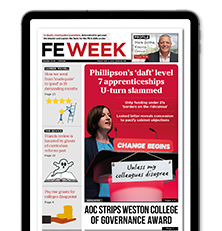We asked a few FE heroes what they thought of our first year…
The further education and skills sector has always needed a voice. Somewhere to analyse the latest policy proposals, and ask the difficult questions when high quality teaching and learning is threatened. That’s why last summer I decided to launch a weekly newspaper and online website dedicated to covering the FE sector.
Over the last ten months the team at FE Week has investigated the most pressing issues in the sector, from short duration apprenticeships to falling Ofsted inspection grades. In each instance we’ve spent time talking to key stakeholders and listening to those who are most adversely affected.
The results have been overwhelming. The government has made countless U-turns on what we thought were immovable policies and consulted with the sector like never before. But life is never dull in the world of FE policy and implementation. FE loans are on the horizon, Ofsted are introducing a new inspection framework and two new ‘simplified’ funding systems for 16-19 and adult skills are being hotly debated.
The printed newspaper will be taking a break over the summer, although the website will continue to publish news. We’ll also look to see where we can refocus our efforts and expand coverage like never before.
Thank you to everyone who has supported the newspaper throughout this academic year. Onwards and upwards!
Nick Linford, managing editor and founder of FE Week
AN INVESTIGATIVE ANALYSIS OF WHAT’S GOING ON
 FE week has transformed media coverage of FE by creating an outlet for detailed information and real investigative analysis of what’s going on under the surface of the sector. A sector champion such as FE Week has the capacity to build effective cross-sector campaigns.
FE week has transformed media coverage of FE by creating an outlet for detailed information and real investigative analysis of what’s going on under the surface of the sector. A sector champion such as FE Week has the capacity to build effective cross-sector campaigns.
The pressure it has built up around apprenticeship quality has been fantastic; this power can be carried across other education policy areas such as the introduction of FE fees and loans, and to celebrate the huge impact that student voice has on quality, retention and student experience in those providers that do it best.
In the absence of FE Week over the summer, we have to remember that policymaking does not end and that a busy summer is often the rug that policy changes are swept under. NUS will be spending the summer building towards a national demonstration against the bleak future faced by students of all ages and at all levels and I’d hope that FE Week readers will be joining us on November 21.
Toni Pearce, VP (FE) at the National Union of Students
IT HAS CREATED A REAL BUZZ AND FILLED A VOID
 Well done to FE Week on completing its first academic year. Set against a backdrop of dwindling coverage of FE issues in the wider media, it has created a real buzz and filled a void for news specifically for our sector. I hope it will continue to be a voice for the FE community and to report on the good news and success stories, as well as outlining the challenges and changes ahead. These have been manifold over the past 12 months and show no signs of abating in 2012/13.
Well done to FE Week on completing its first academic year. Set against a backdrop of dwindling coverage of FE issues in the wider media, it has created a real buzz and filled a void for news specifically for our sector. I hope it will continue to be a voice for the FE community and to report on the good news and success stories, as well as outlining the challenges and changes ahead. These have been manifold over the past 12 months and show no signs of abating in 2012/13.
The sector will need to respond to the impact of planned changes to 16-19 funding and programmes of study, FE loans, and changes to the inspection framework, not to mention planned curriculum changes in A-levels and functional skills.
Despite this sometimes overwhelming agenda and reductions in public funds, the FE sector is rising to the challenge of developing the nation’s skills base to support the economic recovery. We hope colleges’ efforts will be aided by a better dialogue with policymakers and fewer distractions from ministers. ASCL and its affiliated association, PPC, will continue to put weight behind these efforts and to support colleagues individually.
Brian Lightman, general secretary of the ASCL
PROVIDING DETAILED COVERAGE OF THE SECTOR
 With national media coverage of our sector becoming a distant memory, except when there is a scandal to report, FE Week has been a welcome addition to the debate surrounding FE and skills reform over the past 12 months. To borrow school governor parlance, it might be described as a “critical friend”, although it has arguably stretched the friendship a little too far on occasion!
With national media coverage of our sector becoming a distant memory, except when there is a scandal to report, FE Week has been a welcome addition to the debate surrounding FE and skills reform over the past 12 months. To borrow school governor parlance, it might be described as a “critical friend”, although it has arguably stretched the friendship a little too far on occasion!
But it is important to recognise the positive things about FE Week’s arrival, starting with the fact that it is filling a huge gap in providing detailed coverage of the sector and that launching a print publication of any kind in the current economic climate is brave.
The “FE Week Gets Technical” charts are an excellent innovation for those of us who sometimes only have a few minutes on a train to catch up on certain developments, while it is encouraging to see the space given over to stakeholders to offer their views on current issues.
Independent providers are also welcoming that their part of the sector is receiving regular coverage and, surprise, surprise, this means that they have started advertising in FE Week.
It is ironic, though, that I am making this contribution to an “end of term” issue when the work-based learning community will carry on working with young apprentices and employers throughout the summer as we fight to get Britain out of recession.
I would like to see the paper develop more of its analytical side over the coming months, yet overall AELP is very happy to work with FE Week to see it grow and contribute to ongoing debates in the sector.
Graham Hoyle, chief executive of AELP
POWERFUL INVESTIGATIVE JOURNALISM
 It’s been a busy year for the FE and Skills sector, but then which year hasn’t been busy? There are many contentious issues facing FE, but we need to remember we are also presented with opportunities to work together, to shape the future, and to create our destiny.
It’s been a busy year for the FE and Skills sector, but then which year hasn’t been busy? There are many contentious issues facing FE, but we need to remember we are also presented with opportunities to work together, to shape the future, and to create our destiny.
One of the differences this year is that we have had FE Week accompanying us on every step of the journey. It is not often that a publication makes its mark as quickly as FE Week has, but the sector has welcomed having its own expert journal and powerful investigative journalism focused on the critical issues, however uncomfortable that may be at times. Alongside well-written articles, FE Week has provided a much needed opportunity and forum for the sector’s own leaders to engage in real debate about the big issues we face on a weekly basis.
The focus for the next academic year has to be on teaching and learning – improving and maintaining the quality of what our learners experience, particularly in the classroom or work environment and demonstrating the really innovative ways in which the sector gets the best out of people.
I hope that FE Week will help provide a platform for highlighting and debating evidence about effective practice which will inform the new Commission on Adult Vocational Pedagogy. The challenge of youth unemployment will continue to be a major concern during 2012/13 – read our new policy paper which has just been published (see page 9).
I wish all your readers a well-earned summer break, and hope they return fresh and energetic for a new academic year.
Lynne Sedgmore, executive director of the 157 Group
UNDOUBTEDLY, FE WEEK HAS FILLED A GAP
 For working people, who care about learning and training, there are big issues looming. The move to FE loans is a great worry. Surely it is inconceivable that employers will start asking their over-24 level 3 apprentices to fund their own training out of a loan. But what about others? The BIS research shows a very mixed and uncertain picture.
For working people, who care about learning and training, there are big issues looming. The move to FE loans is a great worry. Surely it is inconceivable that employers will start asking their over-24 level 3 apprentices to fund their own training out of a loan. But what about others? The BIS research shows a very mixed and uncertain picture.
The likely appetite for learning among older workers could plummet. Women and BME working people are more likely to be put off. Of course there are also upsides too, such as the opportunity to borrow to pursue long- cherished ambitions, just like HE students. But there must be a major communications drive and a readiness to tackle emerging problem areas with additional help and to think again.
Nobody can be content when 20 per cent of apprentices are not even receiving the Statutory Minimum Wage and a similar number report not getting the minimum SASE compliant training. It is welcome that NAS and BIS are now tackling this with urgency. So is Unionlearn. We will be campaigning for better enforcement and will highlight any abuses we find.
Undoubtedly FE Week has filled a gap. But one aspect of the paper is slightly depressing. The focus on technical issues, including micro adjustments to meet the funding formulae reflects, of course, the reality for colleges and other providers.
But I look forward to the day when FE Week carries just as many stories of imaginative, new provision; geared to meeting employment needs – enthusiastically supported by a new and more liberal funding regime with the active involvement of all social partners.
Tom Wilson, director of Unionlearn
HAS THE FEEL OF A WELL ESTABLISHED NEWSPAPER
 Is this really only issue 36 of FE Week? It has the feel of a well-established newspaper that makes waves. It revealed inadequacies in apprenticeships that were at first denied by ministers and the National Apprenticeship Service and then, when the excuses ran out, acted on with moves to ban inadequate and unjustifiably short courses.
Is this really only issue 36 of FE Week? It has the feel of a well-established newspaper that makes waves. It revealed inadequacies in apprenticeships that were at first denied by ministers and the National Apprenticeship Service and then, when the excuses ran out, acted on with moves to ban inadequate and unjustifiably short courses.
FE Week has its detractors as well as its admirers, but sets a high benchmark that it must maintain. I suggest three inter-related areas for critical attention in the coming year: leadership and governance, deregulation and financial survival – what people will do to keep their institutions going when faced with reduced funding.
Deregulation is sweeping through FE just when the full extent of damage from the failure to regulate banks and markets adequately is being exposed. Effective regulation should not be overbearing but supportive, nurturing effective leadership and governance at all levels.
However, to the current government, ideologically obsessed with “small government”, almost any level of regulation is anathema.
The consequent failure to be watchful resulted in the abuses and financial mismanagement of pockets of apprenticeship provision exposed by FE Week.
We’ve been here before. Almost 20 years ago, after college incorporation, politicians started with denials and were then forced to act on growing scandals that gave FE such a lasting bad reputation and led to the very regulations the Coalition Government is busy dismantling.
With less regulation, we need a vigilant fourth estate (FE Week) to keep close scrutiny on what institutions are doing to survive.
Ian Nash, former editor of FE Focus










The cake looks amazing! Well done all! What an adventure. Wish I could have celebrated with you! 🙂
Keep up the good work
Happy Birthday! Thanks for a year of brilliant articles and keeping the sector informed.
Well done – keep up the news, updates and jobs. Just what FE needs!
Excellent informative paper . Much enjoyed. Accessible to those who are
not experts in the field.
Congratualtions on having made such an impact and on keeping up the
momentum .
Congratulations on your first year! Thanks for all the informative articles. Keep up the good work.